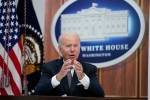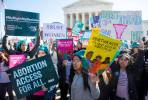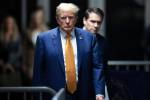A tiny sliver of hope in an otherwise hopeless ruling?
Well, now what?
Now that the U.S. Supreme Court has taken another giant bite out of the hollow chocolate Easter bunny that was our campaign finance reform system, what are we supposed to do? Somehow, surrendering to the big money donors who are increasingly influential in our political system just seems wrong.
But there’s a tiny bit of hope, as inadequate as it may be: disclosure. More of it. Lots of it.
Yes, it’s frustrating to say the very best we can do is figure out who’s buying our democracy, rather than, say, preventing them from buying it in the first place. But, as Loyola Law School associate clinical professor Jessica Levinson told me on Wednesday, it may be all we have left.
The decision
By way of background, the 5-4 majority decision in McCutcheon, et. al. v. Federal Election Commission began when a man named Shaun McCutcheon contributed $33,088 to 16 different candidates to federal office. He says he wanted to contribute more, but he was thwarted by a federal limit on the aggregate amount a person may contribute to candidates in a given election.
(Quick, admittedly incomplete definition: There are so-called base limits, which cap how much a person can give to an individual candidate — in the 2013-2014 cycle, that’s $2,600 for a primary election and $2,600 for a general, or a total of $5,200. And then there are so-called aggregate limits, which cap how much an individual can give to candidates, committees and groups overall, which currently is $123,200.)
Having reached his aggregate limit on contributions to individual members of Congress, McCutcheon sued, seeking to overturn the aggregate limit, but not the base limits. And the court, led by Chief Justice John Roberts, was only too happy to oblige, because, you know, freedom.
Or, at the court put it, aggregate limits — authorized by the seminal campaign finance case of Buckley v. Valeo in 1976 — don’t serve the legitimate government interest in fighting corruption or the appearance of corruption, as base limits still do. Not only that, but there are less burdensome alternatives Congress could enact.
A few excerpts of the plurality’s decision (Justice Clarence Thomas wrote a separate opinion, concurring in the judgment but indicating he would go farther than four of his fellow justices in overturning limits):
• “There is no right more basic in our democracy than the right to participate in electing our political leaders. Citizens can exercise that right in a variety of ways: The can run for office themselves, vote, urge others to vote for a particular candidate, volunteer to work on a campaign and contribute to a candidate’s campaign.”
• “Money in politics may at times seem repugnant to some, but so too does much of what the First Amendment vigorously protects. If the First Amendment protects flag burning, funeral protests, and Nazi parades — despite the profound offense such spectacles cause — it surely protects political campaign speech despite popular opposition.”
• “…we have made clear that Congress may not regulate contributions simply to reduce the amount of money in politics, or to restrict the political participation of some in order to enhance the relative influence of others.”
• “An aggregate limit on how many candidates and committees an individual may support through contributions is not a ‘modest restraint’ at all. The government may no more restrict how many candidates or causes a donor may support than it may tell a newspaper how many candidates it may endorse.” (emphasis in original)
• “No matter how desirable it may seem, it is not an acceptable governmental objective to ‘level the playing field’ or to ‘level electoral opportunities’ or to ‘equaliz[e] the financial resources of candidates.’ … As we framed the relevant principle in Buckley, ‘the concept that government may restrict the speech of some elements of our society in order to enhance the relative voice of others is wholly foreign to the First Amendment.”
• “The government has a strong interest, no less critical to our democracy system, in combating corruption and its appearance. We have, however, held that this interest must be limited to a specific kind of corruption — quid pro quo corruption — in order to ensure the government’s efforts do not have the effect of restricting the First Amendment right of citizens to choose who shall govern them.”
The dissent
Justice Stephen Breyer penned the dissent, joined by Justices Ruth Bader Ginsburg, Sonia Sotomayor and Elena Kagan, which sharply contradicted the majority view and warned the the ruling would lead to an increase in the influence of wealthy donors in the political process. Highlights:
• “It [the decision] creates a loophole that will allow a single individual to contribute millions of dollars to a political party or to a candidate’s campaign. Taken together with Citizens United v. Federal Election Commission …, today’s decision eviscerates our nation’s campaign finance laws, leaving a remnant incapable of dealing with the grave problems of democratic legitimacy that those laws were intended to resolve.”
• “Consider at least one reason why the First Amendment protects political speech. Speech does not exist in a vacuum. Rather, political communication seeks to secure government action. A politically oriented ‘marketplace of ideas’ seeks to form a public opinion that can and will influence elected representatives.”
• “Corruption breaks the constitutionally necessary ‘chain of communication’ between the people and their representatives. It derails the essential speech-to-government-action tie. Where enough money calls the tune, the general public will not be heard. Insofar as corruption cuts the link between political thought and political action, a free marketplace of political ideas loses its point. That is one reason why the court has stressed the constitutional importance of Congress’ concern that a few large donations not drown out of the voices of the many.”
• “The court in McConnell [v. Federal Election Commission] upheld these new contribution restrictions under the First Amendment for the very reason the plurality today discounts or ignores. Namely, the court found they thwarted a significant risk of corruption — understood not as quid pro quo bribery, but as privileged access to and pernicious influence upon elected representatives.”
• “There was an indisputable link between generous political donations and opportunity after opportunity to make one’s case directly to a member of Congress.”
• (Quoting McConnell): “Just as troubling to a functioning democracy as classic quid pro quo corruption is the danger that elected officials will decide issues not on the merits or the desires of their constituencies, but according to the wishes of those who have made large financial contributions valued by the officeholder.”
• “Here, as in Buckley, in the absence of limits on aggregate political contributions, donors can and likely will find ways to channel millions of dollars to parties and to individual candidates, producing precisely the kind of ‘corruption’ or ‘appearance of corruption’ that previously led the court to hold aggregate limits constitutional.”
Help me, disclosure. You’re my only hope!
And that brings us back to the question I began with: What now?
I asked Levinson whether, in light of today’s decision, as well as 2010’s Citizens United, there was a way to write a campaign-finance law that could both limit the influence of money in politics and survive constitutional scrutiny from the court’s sitting majority. The depressingly brief answer: Nope.
“We no longer have the tools to regulate what we wanted to regulate in the first place,” said Levinson, who says she’s worried that even base contribution limits may fall soon, too. “I’m very pessimistic in the short term. I think this is our new normal.”
I asked if this ruling wasn’t really addressed to — and concerned about — the wealthy. After all, how many lower and middle class people can even afford to give the minimum donation of $2,600 per election, much less decide how to spend millions among multiple candidates? Regular people giving a nominal amount, say, $200, would have to number 490,000 simply to equal the $98 million that billionaire Las Vegas Sands CEO gave to candidates and causes in 2012 alone.
“Our voices are increasingly muffled,” Levinson said. “We should be speakers, too. … There are only five people in America who don’t think large amounts of contributions don’t influence elections, and they’re all on the court.”
But, there is a small sliver of hope: disclosure.
In McCutcheon, the majority held that disclosure requirements would meet First Amendment scrutiny. Said the court: “Disclosure requirements burden speech, but — unlike the aggregate limits — they do not impose a ceiling on speech,” the ruling reads. “For that reason, disclosure often represents a less restrictive alternative to flat bans on certain types or quantities of speech.”
That’s similar to what the court majority held in Citizens United, as well, writing: “Disclaimer and disclosure requirements may burden the ability to speak, but they ‘impose no ceiling on campaign-related activities,’ … or ‘prevent anyone from speaking,’…. The Buckley Court explained that disclosure can be justified by a governmental interest in providing ‘the electorate with information’ about election-related spending sources.”
(However, the court did allow that disclosure rules could be challenged if a plaintiff could demonstrate reasonable grounds that disclosing donors would “subject them to threats, harassment, or reprisals from either government officials or private parties.”)
Attempts have been made to pass fuller disclosure laws. Most recently, in 2012, the Senate failed to pass the DISCLOSE Act, which would have required independent groups to disclose their donors if they spent more than $10,000 in an election. But the court seems to be signaling that, instead of limits on contributions and spending (which the justices consider free speech) disclosure requirements are more likely to pass constitutional muster.
Levinson noted that disclosure, while helpful, is only a partial remedy, and one that doesn’t stop wealthy donors from having an outsized voice in the political debate. But she said it may be the only remedy available, given the court’s recent rulings.
“At some point, I think the court will say that’s all you have left,” she said.






















